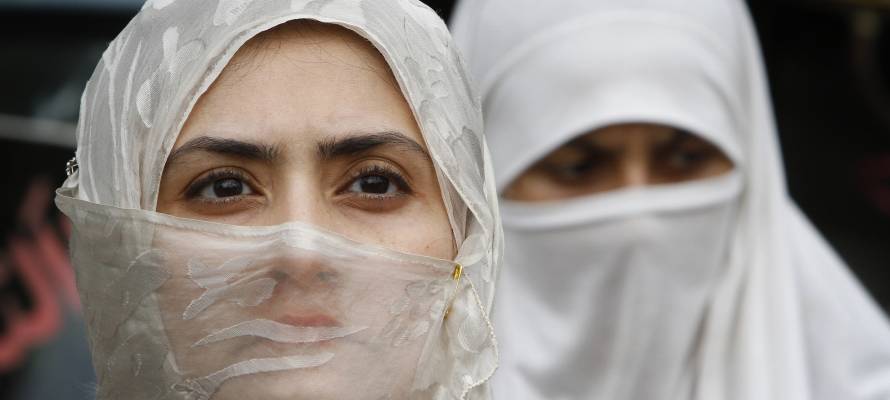Unfortunately, learning about “why some women don’t choose to wear it” – or more pointedly, what happens to women in certain Muslim countries and societies who have no choice whether or not to wear it — was not part of the program. Muslim human rights activist Asra Nomani pleads, “Do not wear a headscarf in ‘solidarity’ with the ideology that most silences us.”
School officials in Rochester, New York are getting flak from angry parents and teachers for holding an event in solidarity with World Hijab Day. The event, held at the school and during school hours, encouraged the high school girls to wear the Islamic headscarf for the day. Boys were given carnations to wear in solidarity.
Unsuspecting students put on the 150 headscarves that were brought by teachers before the first bell rang. They were encouraged to participate in the “cultural event” by the school’s principal Sheela Webster, who insisted the headscarf had nothing to do with religion, but rather all about the “experiental” and “was actually around learning about the cloth.”
“Our perspective in it was not religious – it was really about experiential,” she said. “We are an experiential school; we engage kids in all kinds of activities and projects all of the time, so the perspective of being able to learn what a hijab is, why some women choose to wear it and why some women don’t choose to wear it, and we provide the opportunity to experience it; it is well within protocol of experiential learning.”
Unfortunately, learning about “why some women don’t choose to wear it” – or more pointedly, what happens to women in certain Muslim countries and societies who have no choice whether or not to wear it — was not part of the program.
As prominent Muslim human rights activist Asra Nomani writes in the Washington Post, events such as these are a “painful reminder of the well-financed effort by conservative Muslims to dominate modern Muslim societies. This modern-day movement spreads an ideology of political Islam, called ‘Islamism,’ enlisting well-intentioned interfaith do-gooders and the media into promoting the idea that ‘hijab’ is a requirement of Islam.”
Concurrent with the advent Islamism comes the culture of “honor,” the idea that a family’s or a husband’s honor lies in the chastity and modesty of their female members. To the Islamist, the hijab has become the quintessential symbol of that honor.
Stories have, unfortunately, become common in our time of women — both in the West as well in Muslim countries– who have been “honor” killed by their families or societies for not wearing a hijab.
Asra Nomani grew up in India in the 1960s in a conservative Muslim family. Yet, there was no Islamic law at the time that women should cover their hair. “But, starting in the 1980s,” she relates, “following the 1979 Iranian revolution of the minority Shiite sect and the rise of well-funded Saudi clerics from the majority Sunni sect, we have been bullied in an attempt to get us to cover our hair from men and boys.”
On a theological level, it is interesting to note how many prominent Islamic theologians reject the idea that women are required to wear a hijab.
It is likely that high school sophomore Eman Muthana, originally from Yemen, who wears a hijab and requested the event, was unaware of history of the cloth she wears around her head every day.
Commenting on the event, Muthana said, “I just feel proud that I’m sharing my culture and actually not forcing that on them, because everybody has the choice to do that so. I just feel happy that they are supporting me. We are in America; everybody has the freedom of religion, I cannot force anything. And also, I cannot do anything bad to a country that opened its door for me.”
But somewhere, it seems, that was some coercion. A spokesman for the school district said, after consulting with a lawyer, he was told “there would be more of a legal issue if the school said no to the event” than to host it.
Locals took to social media to voice their disapproval. High school teacher Jim Farnholz wrote, “As a high school teacher for over 30 years, let me say that this is wrong on so many levels. All religions are taught in our global studies classes. That being said, that is where understanding, tolerance and the good and bad of religion and history are taught. This, however, is a clear violation of separation of church and state.”
“What lesson will they wear a Yarmulke in? Or the Christian cross? Or the Hindu turban?” Dan Lane posted. “Funny how it always seems to be the Muslims they learn about, even in Common Core.”
“How disgusting and irresponsible for any educator to encourage a child to wear a symbol of oppression, whether it be religious or cultural,” Rebecca Sluman wrote.
Americans, who enjoy, religious freedom, must be wary of becoming unknowing accomplices to the agenda of political Islam. Commenting on events such as these, Nomani pleads, “Do not wear a headscarf in ‘solidarity’ with the ideology that most silences us, equating our bodies with ‘honor.’ Stand with us instead with moral courage against the ideology of Islamism.”
By: Meira Svirsky. Svirsky is the editor of ClarionProject.org.

Do You Love Israel? Make a Donation - Show Your Support!
Donate to vital charities that help protect Israeli citizens and inspire millions around the world to support Israel too!
Now more than ever, Israel needs your help to fight and win the war -- including on the battlefield of public opinion.
Antisemitism, anti-Israel bias and boycotts are out of control. Israel's enemies are inciting terror and violence against innocent Israelis and Jews around the world. Help us fight back!
See our Privacy Policy


